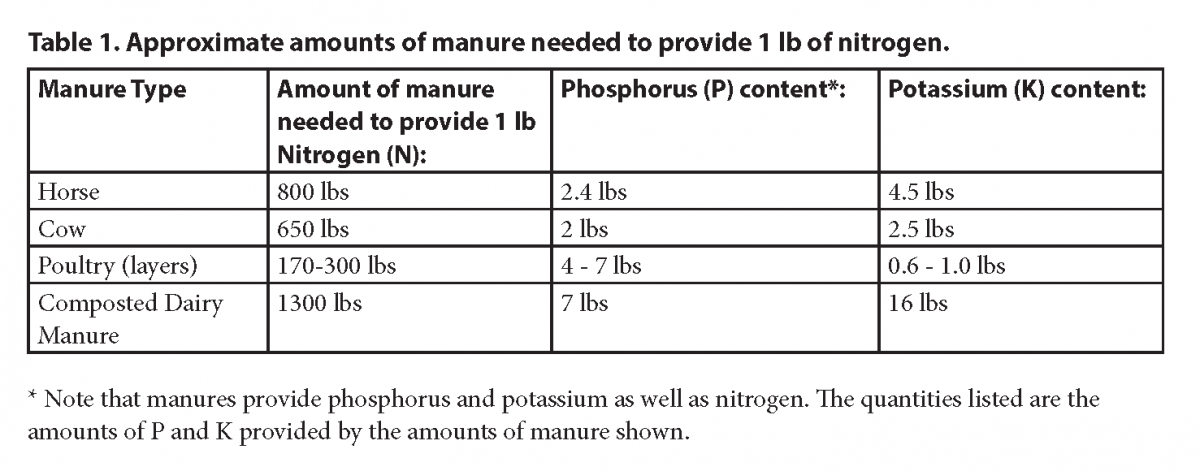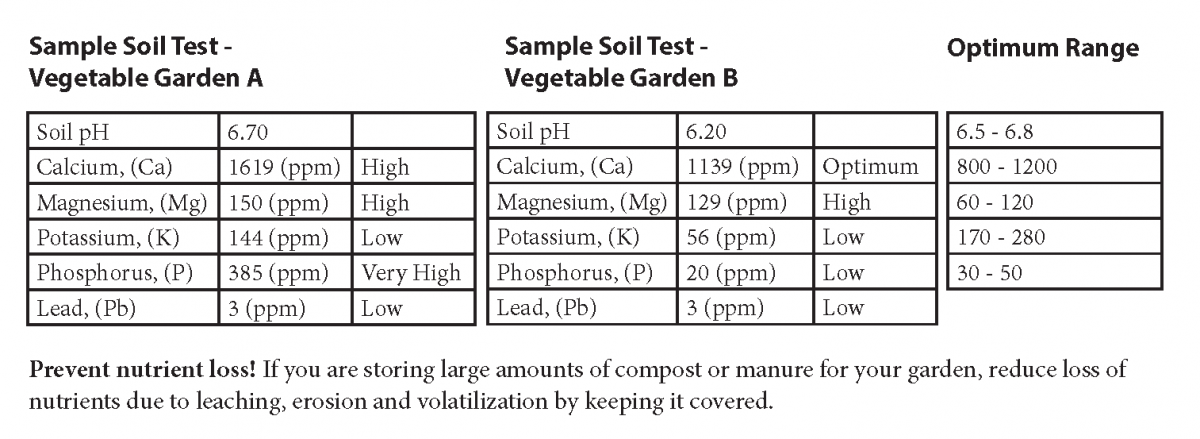Animal manures and animal manure-based composts are rich in plant nutrients such as Nitrogen (N), Phosphorous (P) and Potassium (K) and provide organic matter that conditions the soil. While they can make excellent soil amendments for the home gardener, it is important to use them effectively and safely.
Manure or Compost?
There are no regulations or standards in New Hampshire that govern the many labels that can be used to describe soil amendments (“manure”, “aged manure”, “rotted manure”, “composted”, etc.). For the purposes of this fact sheet, “compost” refers to any mix of organic materials that has been partially decomposed to the point where its nutrient content is stable. This typically implies an active process, where the organic materials are managed carefully to speed decomposition. “Manure” refers to waste from livestock (including poultry, cattle, or horses), usually mixed with bedding such as sawdust or wood shavings and/or feed waste. Manures may be fresh – that is, they have not decomposed at all, or they may have decomposed (or “aged”) to varying degrees.
Nutrient Content
Generally, plant nutrients in manures and composts are measured in terms of pounds per wet ton; it takes a lot of these materials to provide enough nutrients for plant growth. Nutrient content varies widely depending on the type of manure and the amount and type of bedding in it, and the ingredients in compost. While gardeners can use some general guidelines for nutrient content (see table below), the most accurate way to determine fertilizer equivalency is to have the material tested.

While most of the nutrients in manures and composts behave similarly in the soil to nutrients from commercial fertilizers, nitrogen is an exception. First, much of the nitrogen is not immediately available to plants, but instead becomes available slowly, as microbes digest it. Also, the availability of nitrogen depends on the ratio of carbon to nitrogen (C:N ratio). If the ratio exceeds 30:1, then most of the nitrogen is immobilized, or unavailable to plants, for an extended period. Manures or unfinished composts that contain a high proportion of bedding like wood shavings or sawdust have a high C:N ratio. This type of material “borrows” nitrogen from the soil as it decomposes, and the result is that garden plants may not have the nitrogen they need to grow.
Environmental Concerns
The proportions of plant nutrients in composts and manures are usually different from what plants require for growth. In particular, these materials often contain more phosphorus than nitrogen. Thus, gardeners that apply enough of these materials to meet nitrogen needs for their gardens will likely apply far more phosphorus than is needed. Over time, this can lead to very high levels of soil phosphorus.
What’s the problem with high phosphorus? Very high soil phosphorus is not toxic, and will not harm plants or people, but when phosphorus moves into surface waters, it can lead to algae blooms, which harm water quality and aquatic organisms.
In order to use manures and composts effectively and responsibly, start with testing your soil for pH and soil nutrient status. If soil phosphorus is in the low to optimum range (up to 50 ppm on the University of New Hampshire (UNH) soil test), feel free to use manure or compost to provide nutrients. If soil phosphorus test levels are very high (over 100 ppm on UNH’s soil test), consider using nutrient sources other than manure.
In the soil test examples below, Garden A has very high levels of phosphorus, because of a history of compost applications. While nitrogen and potassium fertilizers are still needed for crops in this garden, this gardener should not add more compost or manure, to avoid becoming a source of phosphorus contamination. In contrast, Garden B has probably had very little or no compost or manure added to it, since the soil phosphorus levels are quite low. In this case, the gardener could add composts or manures to provide nutrients and organic matter.

Food Safety
For all the benefits of using manure and manure-based composts in the garden, there are also some risks. Animal manures harbor pathogens harmful to humans, including E. coli, Salmonella, and Campylobacter bacteria, and Giardia or Cryptosporidium protozoa. These organisms can affect people when they consume crops contaminated with soil, and under certain conditions, they can be taken up into plant tissue.
The risk from pathogens is greatly reduced when manure is composted correctly. To ensure that pathogens have been killed, the compost pile must reach a high temperature (between 131°F and 140°F) for a sustained period of time (several weeks). The compost must also be turned regularly and carefully monitored so that all of the manure has been exposed to sufficient temperatures. In home compost piles and in unmanaged manure piles, this rarely happens. Aged manure is not the same as composted manure, and it is not safe to assume that pathogens in an aged manure pile have been destroyed.
Another strategy for destroying pathogens is pasteurization. Some commercial poultry manure products are processed in this way. Pathogens, begin to die once incorporated into garden soil, and research has shown that incorporating manure at least 120 days before harvest greatly reduces risks of food borne illness.
Herbicide Residue
There have been many cases where vegetable gardeners have unknowingly used manure and composts that are contaminated with herbicides and have seen herbicide injury in their vegetable gardens. The herbicides of concern are broadleaf herbicides used on lawns, turfgrass, pastures, and hay crops. Some of these materials can retain herbicidal activity for a long time, even after passing through an animal’s digestive system, and even after the resulting manure is composted. Treated grass clippings, and compost made from treated grasses, can also retain residues. The herbicides do eventually breakdown and lose activity over time, particularly as they are exposed to microbes, heat and moisture. This can take place relatively quickly, or can take up to several years, depending on the situation.
On sensitive crops, these herbicides can cause poor germination and kill seedlings, and they cause new leaves to become twisted and malformed. Sensitive crops include a wide array of crops including tomato and other solanaceous crops, lettuce, beans and other legumes, strawberries, grapes, and most other vegetable crops.
If you purchase manures and composts, make sure to be aware of this possibility and get assurance that herbicides are not present.
To Minimize the Health Risks Associated with Using Manures in Home Gardens
- Wait at least 120 days after applying raw or aged manure to harvest crops that grow in or near the soil (root crops, leafy greens, strawberries). Wait at least 90 days for other crops.
- Once the garden is planted, avoid using animal manures unless they have been pasteurized or actively composted.
- Never use cat, dog or pig manure in your compost pile or your vegetable garden. These manures are more likely to contain parasites that infect humans than other manures.
- Wash vegetables before eating.
- People who are especially susceptible to foodborne illnesses should avoid eating uncooked vegetables from manured gardens. Those who face special risks from foodborne illness include pregnant women, very young children, and persons with chronic diseases.
In Conclusion
While manures and composts are excellent soil amendments for the home gardener, gardeners should be aware of the potential environmental and health risks associated with using manures and manure-based composts. Regular soil testing can help gardeners avoid soil phosphorus buildup from continuously applying manures and composts to soils, and gardeners can follow some simple tips to reduce the health risks associated with applying fresh manures to vegetable gardens.
Download the Resource for the complete fact sheet and a printable version.

